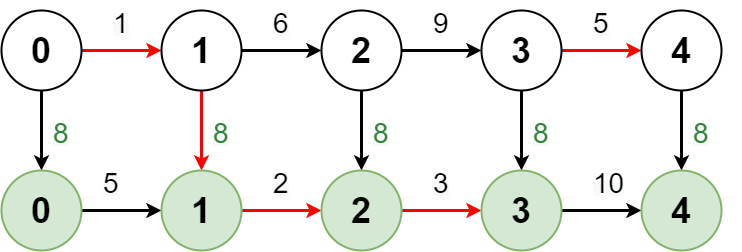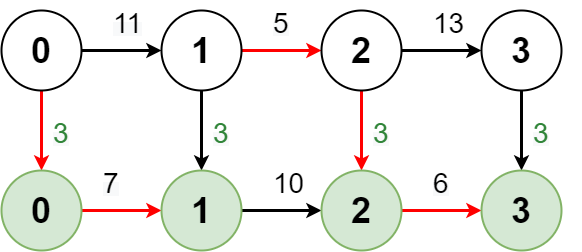2361. Minimum Costs Using the Train Line 🔒
Description
A train line going through a city has two routes, the regular route and the express route. Both routes go through the same n + 1 stops labeled from 0 to n. Initially, you start on the regular route at stop 0.
You are given two 1-indexed integer arrays regular and express, both of length n. regular[i] describes the cost it takes to go from stop i - 1 to stop i using the regular route, and express[i] describes the cost it takes to go from stop i - 1 to stop i using the express route.
You are also given an integer expressCost which represents the cost to transfer from the regular route to the express route.
Note that:
- There is no cost to transfer from the express route back to the regular route.
- You pay
expressCostevery time you transfer from the regular route to the express route. - There is no extra cost to stay on the express route.
Return a 1-indexed array costs of length n, where costs[i] is the minimum cost to reach stop i from stop 0.
Note that a stop can be counted as reached from either route.
Example 1:

Input: regular = [1,6,9,5], express = [5,2,3,10], expressCost = 8 Output: [1,7,14,19] Explanation: The diagram above shows how to reach stop 4 from stop 0 with minimum cost. - Take the regular route from stop 0 to stop 1, costing 1. - Take the express route from stop 1 to stop 2, costing 8 + 2 = 10. - Take the express route from stop 2 to stop 3, costing 3. - Take the regular route from stop 3 to stop 4, costing 5. The total cost is 1 + 10 + 3 + 5 = 19. Note that a different route could be taken to reach the other stops with minimum cost.
Example 2:

Input: regular = [11,5,13], express = [7,10,6], expressCost = 3 Output: [10,15,24] Explanation: The diagram above shows how to reach stop 3 from stop 0 with minimum cost. - Take the express route from stop 0 to stop 1, costing 3 + 7 = 10. - Take the regular route from stop 1 to stop 2, costing 5. - Take the express route from stop 2 to stop 3, costing 3 + 6 = 9. The total cost is 10 + 5 + 9 = 24. Note that the expressCost is paid again to transfer back to the express route.
Constraints:
n == regular.length == express.length1 <= n <= 1051 <= regular[i], express[i], expressCost <= 105
Solutions
Solution 1: Dynamic Programming
We define $f[i]$ as the minimum cost from station $0$ to station $i$ when arriving at station $i$ by the regular route, and $g[i]$ as the minimum cost from station $0$ to station $i$ when arriving at station $i$ by the express route. Initially, $f[0]=0, g[0]=\infty$.
Next, we consider how to transition the states of $f[i]$ and $g[i]$.
If we arrive at station $i$ by the regular route, we can either come from station $i-1$ by the regular route or switch from the express route at station $i-1$ to the regular route. Therefore, we can get the state transition equation:
$$ f[i]=\min{f[i-1]+a_i, g[i-1]+a_i} $$
where $a_i$ represents the cost of taking the regular route from station $i-1$ to station $i$.
If we arrive at station $i$ by the express route, we can either switch from the regular route at station $i-1$ to the express route or continue on the express route from station $i-1$. Therefore, we can get the state transition equation:
$$ g[i]=\min{f[i-1]+expressCost+b_i, g[i-1]+b_i} $$
where $b_i$ represents the cost of taking the express route from station $i-1$ to station $i$.
We denote the answer array as $cost$, where $cost[i]$ represents the minimum cost from station $0$ to station $i$. Since we can reach station $i$ from any route, we have $cost[i]=\min{f[i], g[i]}$.
Finally, we return $cost$.
The time complexity is $O(n)$ and the space complexity is $O(n)$, where $n$ is the number of stations.
Python3
class Solution:
def minimumCosts(
self, regular: List[int], express: List[int], expressCost: int
) -> List[int]:
n = len(regular)
f = [0] * (n + 1)
g = [inf] * (n + 1)
cost = [0] * n
for i, (a, b) in enumerate(zip(regular, express), 1):
f[i] = min(f[i - 1] + a, g[i - 1] + a)
g[i] = min(f[i - 1] + expressCost + b, g[i - 1] + b)
cost[i - 1] = min(f[i], g[i])
return cost
Java
class Solution {
public long[] minimumCosts(int[] regular, int[] express, int expressCost) {
int n = regular.length;
long[] f = new long[n + 1];
long[] g = new long[n + 1];
g[0] = 1 << 30;
long[] cost = new long[n];
for (int i = 1; i <= n; ++i) {
int a = regular[i - 1];
int b = express[i - 1];
f[i] = Math.min(f[i - 1] + a, g[i - 1] + a);
g[i] = Math.min(f[i - 1] + expressCost + b, g[i - 1] + b);
cost[i - 1] = Math.min(f[i], g[i]);
}
return cost;
}
}
C++
class Solution {
public:
vector<long long> minimumCosts(vector<int>& regular, vector<int>& express, int expressCost) {
int n = regular.size();
long long f[n + 1];
long long g[n + 1];
f[0] = 0;
g[0] = 1 << 30;
vector<long long> cost(n);
for (int i = 1; i <= n; ++i) {
int a = regular[i - 1];
int b = express[i - 1];
f[i] = min(f[i - 1] + a, g[i - 1] + a);
g[i] = min(f[i - 1] + expressCost + b, g[i - 1] + b);
cost[i - 1] = min(f[i], g[i]);
}
return cost;
}
};
Go
func minimumCosts(regular []int, express []int, expressCost int) []int64 {
n := len(regular)
f := make([]int, n+1)
g := make([]int, n+1)
g[0] = 1 << 30
cost := make([]int64, n)
for i := 1; i <= n; i++ {
a, b := regular[i-1], express[i-1]
f[i] = min(f[i-1]+a, g[i-1]+a)
g[i] = min(f[i-1]+expressCost+b, g[i-1]+b)
cost[i-1] = int64(min(f[i], g[i]))
}
return cost
}
TypeScript
function minimumCosts(regular: number[], express: number[], expressCost: number): number[] {
const n = regular.length;
const f: number[] = new Array(n + 1).fill(0);
const g: number[] = new Array(n + 1).fill(0);
g[0] = 1 << 30;
const cost: number[] = new Array(n).fill(0);
for (let i = 1; i <= n; ++i) {
const [a, b] = [regular[i - 1], express[i - 1]];
f[i] = Math.min(f[i - 1] + a, g[i - 1] + a);
g[i] = Math.min(f[i - 1] + expressCost + b, g[i - 1] + b);
cost[i - 1] = Math.min(f[i], g[i]);
}
return cost;
}
We notice that in the state transition equations of $f[i]$ and $g[i]$, we only need to use $f[i-1]$ and $g[i-1]$. Therefore, we can use two variables $f$ and $g$ to record the values of $f[i-1]$ and $g[i-1]$ respectively. This allows us to optimize the space complexity to $O(1)$.
Python3
class Solution:
def minimumCosts(
self, regular: List[int], express: List[int], expressCost: int
) -> List[int]:
n = len(regular)
f, g = 0, inf
cost = [0] * n
for i, (a, b) in enumerate(zip(regular, express), 1):
ff = min(f + a, g + a)
gg = min(f + expressCost + b, g + b)
f, g = ff, gg
cost[i - 1] = min(f, g)
return cost
Java
class Solution {
public long[] minimumCosts(int[] regular, int[] express, int expressCost) {
int n = regular.length;
long f = 0;
long g = 1 << 30;
long[] cost = new long[n];
for (int i = 0; i < n; ++i) {
int a = regular[i];
int b = express[i];
long ff = Math.min(f + a, g + a);
long gg = Math.min(f + expressCost + b, g + b);
f = ff;
g = gg;
cost[i] = Math.min(f, g);
}
return cost;
}
}
C++
class Solution {
public:
vector<long long> minimumCosts(vector<int>& regular, vector<int>& express, int expressCost) {
int n = regular.size();
long long f = 0;
long long g = 1 << 30;
vector<long long> cost(n);
for (int i = 0; i < n; ++i) {
int a = regular[i];
int b = express[i];
long long ff = min(f + a, g + a);
long long gg = min(f + expressCost + b, g + b);
f = ff;
g = gg;
cost[i] = min(f, g);
}
return cost;
}
};
Go
func minimumCosts(regular []int, express []int, expressCost int) []int64 {
f, g := 0, 1<<30
cost := make([]int64, len(regular))
for i, a := range regular {
b := express[i]
ff := min(f+a, g+a)
gg := min(f+expressCost+b, g+b)
f, g = ff, gg
cost[i] = int64(min(f, g))
}
return cost
}
TypeScript
function minimumCosts(regular: number[], express: number[], expressCost: number): number[] {
const n = regular.length;
let f = 0;
let g = 1 << 30;
const cost: number[] = new Array(n).fill(0);
for (let i = 0; i < n; ++i) {
const [a, b] = [regular[i], express[i]];
const ff = Math.min(f + a, g + a);
const gg = Math.min(f + expressCost + b, g + b);
[f, g] = [ff, gg];
cost[i] = Math.min(f, g);
}
return cost;
}